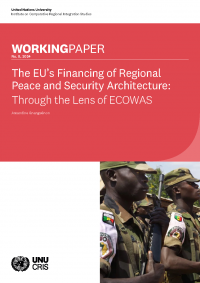The EU’s Financing of Regional Peace and Security Architecture: Through the Lens of ECOWAS

The EU has been both a model, based on the European Economic Community (EEC) experience, and a support resource for improving ECOWAS’s objectives in terms of economic and political integration, good governance, and regional stability. As a main partner, the EU was engaged as a supporting actor through the European Development Fund (EDF) Regional Indicative Programme (RIP). From 2002 (9th EDF RIP) to 2020 (11th EDF RIP), the scope of this financial support was extended from regional economic integration activities towards peace and security cooperation between West African countries.
Under the EDF RIP, the relationship with EU was a good example of the ECOWAS’s expectations regarding partnership in terms of process and alignment with its priorities. Launched in 2021 to promote EU values and interests, the Neighbourhood, Development and International Cooperation Instrument (NDICI) represents another EU ambition to reconstruct the relationship with the African continent. Yet, it is unclear, how the current instrument will strengthen relations between the EU and ECOWAS and not perpetuate challenges and shortcomings of previous European support. Indeed, ECOWAS ownership is still hampered by a lack of resources and capabilities and by its dependency on external funding to support its programmes. From an ECOWAS perspective, EU’s rules and administrative procedures are extremely cumbersome for the ECOWAS Commission to navigate different, sometimes overlapping European programmes and funding.
This paper aims to explore the challenges and opportunities of NDICI’s adoption through the lens of EU-ECOWAS relations as a pilot case. While the NDICI aims to promote EU’s interests in a context of increasing geopolitical competition, ECOWAS should consider the adoption of NDICI as a momentum to leverage a renewal of its partnership with the EU.
